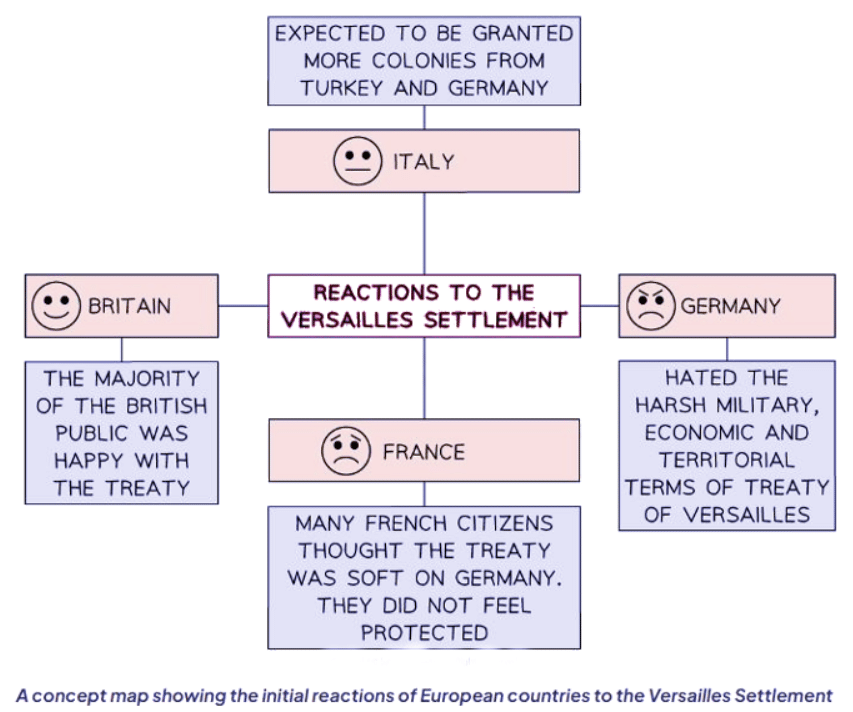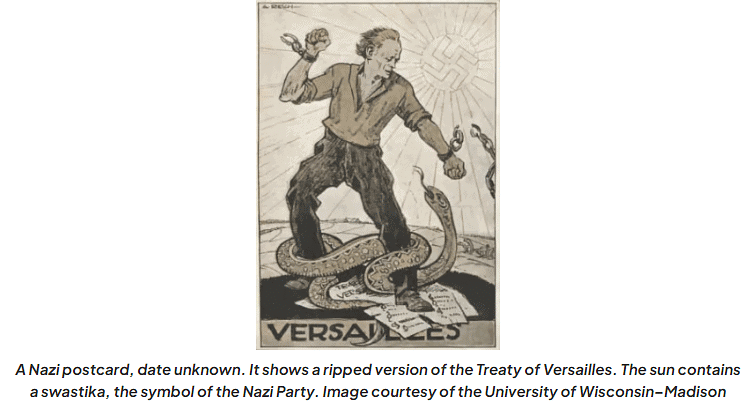Year 11 Exam > Year 11 Notes > History for GCSE/IGCSE > The Long-Term Consequences of the Treaty of Versailles
The Long-Term Consequences of the Treaty of Versailles | History for GCSE/IGCSE - Year 11 PDF Download
| Table of contents |

|
| Europe's Reaction to the Treaty |

|
| November Criminals and the 'Dolchstoss' |

|
| The Rise of Hitler |

|
| How Did Hitler Break the Treaty of Versailles? |

|
Europe's Reaction to the Treaty
- There was a mixed reaction in Europe to the Versailles Settlement in 1919

By 1923:
- Europe's reaction to the Treaty of Versailles started to shift
- In Britain, there was a sentiment that the treaty had been excessively harsh on Germany
- Fears of the USSR rose above concerns about Germany
- Britain sought a robust Germany to safeguard Europe from communism
November Criminals and the 'Dolchstoss'
- Many Germans contended that the Weimar Republic erred in agreeing to the Treaty of Versailles. They believed that German politicians perpetrated a 'dolchstoss' - a metaphorical 'stab in the back'. The statesmen who endorsed the Treaty of Versailles were dubbed 'November Criminals' due to the timing of the armistice signing in November. This act left numerous Germans feeling humiliated and inferior to the rest of Europe.
- The territorial provisions of the Treaty of Versailles fueled a surge in nationalism within Germany. The creation of the Polish Corridor effectively split Germany into two parts. Additionally, approximately 4 million Germans resided in the Sudetenland, which was part of Czechoslovakia.
The Rise of Hitler
- The Treaty of Versailles had a devastating impact on Germany.
- Reparations caused two economic depressions within a decade.
- The German government adhered to the treaty’s terms, causing public resentment.
- Extremist parties like the KPD and the NSDAP gained support.
- The government arrested Hitler after his attempted Munich Putsch.
- While in prison, Hitler wrote Mein Kampf ("My Struggle").

- Hitler believed that, when he gained power, it was right to break the Treaty of Versailles because some of its terms had already been reversed.
- For example, the Allies modified Germany’s reparations through the Dawes and Young Plans.
- Other countries had not kept promises made at the Paris Peace Conference.
- The "Big Three" had agreed to the creation of the League of Nations, which aimed to encourage worldwide disarmament.
- However, countries like France refused to disarm.
- The "Big Three" had agreed to the creation of the League of Nations, which aimed to encourage worldwide disarmament.
- Hitler feared the power of the countries bordering Germany.
- France had already invaded the Ruhr in 1923.
- Germany had no air force and only 100,000 soldiers, making it incapable of defending itself.
- Hitler had public support; in July 1932, the Nazi Party received 38% of the vote, becoming the largest party in the Reichstag.


Question for The Long-Term Consequences of the Treaty of VersaillesTry yourself: What term did many Germans use to describe the politicians who agreed to the Treaty of Versailles?View Solution
How Did Hitler Break the Treaty of Versailles?

The document The Long-Term Consequences of the Treaty of Versailles | History for GCSE/IGCSE - Year 11 is a part of the Year 11 Course History for GCSE/IGCSE.
All you need of Year 11 at this link: Year 11
|
81 videos|86 docs|18 tests
|
FAQs on The Long-Term Consequences of the Treaty of Versailles - History for GCSE/IGCSE - Year 11
| 1. What was the reaction of Europe to the Treaty of Versailles? |  |
Ans. Many European countries were dissatisfied with the treaty, as they believed it was too harsh on Germany and would lead to future conflicts. Some felt that the treaty did not address the root causes of the war and did not achieve lasting peace.
| 2. Who were the November Criminals and what role did they play in the aftermath of the Treaty of Versailles? |  |
Ans. The November Criminals were German politicians who signed the armistice that ended World War I and later signed the Treaty of Versailles. They were blamed by some Germans for the country's defeat and the harsh terms of the treaty, leading to the 'Dolchstoss' (stab-in-the-back) myth.
| 3. How did Hitler rise to power in Germany and what role did the Treaty of Versailles play in his rise? |  |
Ans. Hitler rose to power in Germany through propaganda, manipulation of political events, and exploitation of public discontent. He capitalized on the resentment towards the Treaty of Versailles, promising to overturn its terms and restore Germany's former glory.
| 4. In what ways did Hitler break the Treaty of Versailles once he came to power? |  |
Ans. Hitler broke the Treaty of Versailles by rearming Germany, expanding the military beyond the limits set by the treaty, remilitarizing the Rhineland, and annexing territories such as Austria and Czechoslovakia.
| 5. What were the long-term consequences of the Treaty of Versailles on Europe and the world? |  |
Ans. The Treaty of Versailles contributed to economic instability in Europe, led to the rise of fascist regimes, and ultimately played a role in the outbreak of World War II. It also set the stage for territorial disputes and political tensions that would shape the 20th century.

|
Explore Courses for Year 11 exam
|

|
Signup for Free!
Signup to see your scores go up within 7 days! Learn & Practice with 1000+ FREE Notes, Videos & Tests.
Related Searches
















